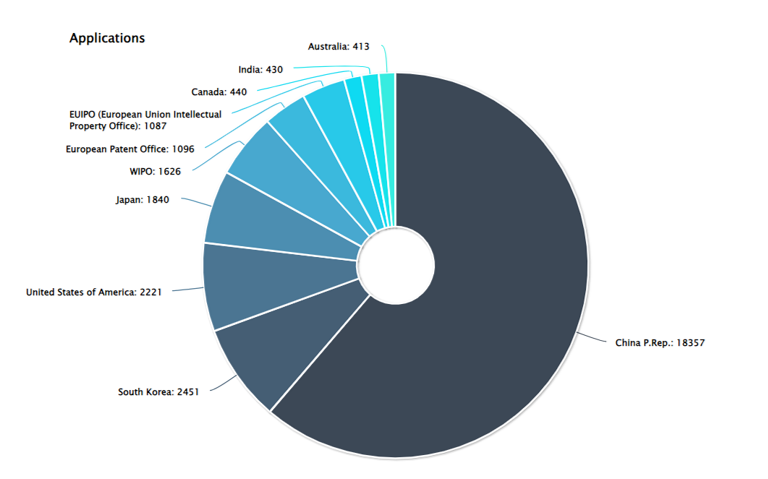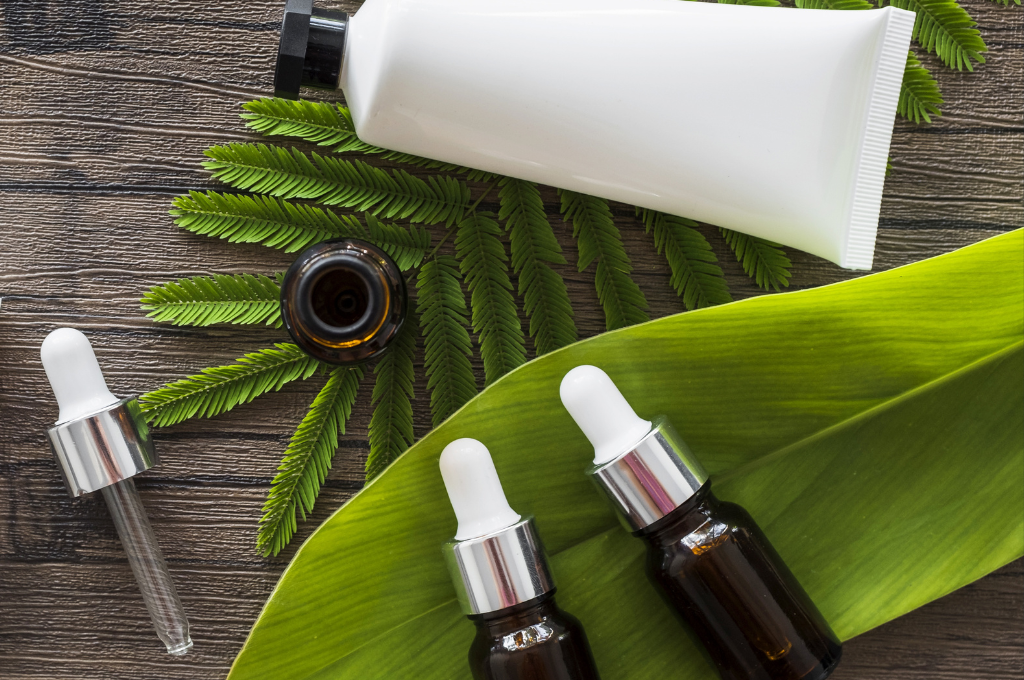The cosmetics industry is a dynamic sector that is constantly growing and responding to the changing needs and preferences of consumers, while at the same time taking advantage of recent technologies and taking care of the environment. Growing consumer awareness of health and environmental aspects is prompting cosmetic companies to develop products that contain natural and organic ingredients and products that are free of microplastics, artificial dyes and chemicals. There is also increasing awareness as far as animal testing and the origin of animal-derived ingredients are concerned, which is why cosmetic companies are more and more often offering vegan products and moving away from testing their products on animals (cruelty free cosmetics). In addition, many companies have started to offer more and more options for personalising products that take into account the individual needs and preferences of consumers, in particular in terms of the selection of ingredients, fragrances or consistency of the formulation. Moreover, in order to reduce the negative impact on the environment, companies have started to invest in the research and development of new green packaging and to use more environmentally friendly packaging, including packaging based on recycled materials.
Latest trends related to the development of technology in the cosmetics industry, which can successfully replace traditional cosmetics, can be seen in a large number of applications for inventions in this field. A search for patent documents relating to cosmetics showed that over the last 3 years, there have been 21,355 patent families covering 33,685 applications for inventions in this field (author’s elaboration based on a search in the PatBase® database of Minesoft®). The countries with the highest number of patent applications for such inventions are China, South Korea, the United States and Japan (Chart 1). Applicants eagerly submitted international applications, which could potentially cover up to 157 countries and regions. The leading companies here are Guangdong Univ. of Technology, Shiseido Co. LTd, LG Household and Healt Care LTd., Loreal SA and Procter and Gamble Co. Ltd.

Chart 1. Countries with the highest number of patent applications
Analysing patent trends geographically, it can be seen that China is the world leader, while in Europe the matter is not so popular. If we look at the number of applications among European countries, the leaders are Germany (366 applications), France (185 applications) and Spain (155 applications), but the total number of applications from these countries is several times lower than in China alone. Considering the number of applications over the last years, it can be observed that the highest increase in new patent applications was seen in 2020.
Among the patent applications we analysed, the trend towards reducing the impact of cosmetics on the environment is noticeable. Natural ingredients such as plant extracts, essential oils, marine algae, etc., which are less toxic to the environment and healthier for humans, are used in the production of cosmetics more and more often. In addition, cosmetics with natural ingredients are becoming increasingly popular among consumers who are looking for products with more ecological and skin-friendly compositions. Natural ingredients come from plants, minerals, and other natural sources, and their advantages often include gentleness, effectiveness, and a lower risk of allergies and irritation. Phytocosmetics, which contain ingredients of plant origin such as oils and plant extracts, herbal and flower extracts, vitamins, and minerals, are also very popular, making them more attractive because they are less likely to cause allergic reactions or irritation than products containing artificial ingredients such as parabens, phthalates or artificial dyes. Moreover, companies produce phytocosmetics from raw materials obtained from sustainable crop production, which supports responsible agriculture and conservation of biodiversity.
Among the recently published inventions, an interesting solution that follows the trend of personalised cosmetics was disclosed in international application WO2022124689A1 to GO HYEON JEE, which relates to a method of providing a personalised ecological cosmetic set compatible with the composition and type of skin of the consumer. The method comprises several steps, the first of which is to enter information about the consumer and data about their skin necessary for its condition to be assessed by skin diagnostic software, which determines the skin type, possible allergies or allergenic factors for a given skin type and then calculates the composition of the cosmetic based on ecological ingredients and, finally, on this basis, a trial set of cosmetics is produced. According to the inventors, the product obtained in this way, tailored to the needs of the consumer, provides effective skin care, and at the same time is a vegan product not tested on animals.
Another approach is to develop a cosmetic composition that will be suitable for a wide group of consumers and will be characterised by a unique and non-obvious composition. For example, cosmetics enriched with cannabidiol (CBD) are becoming increasingly popular due to the potential health benefits it offers to the skin and hair, thanks to its anti-inflammatory, analgesic and anti-allergic properties. Many companies focus on different cosmetic formulas containing CBD and on adjusting doses to different consumer needs. CBD-enriched moisturising creams are known and can help maintain skin hydration and relieve irritation and inflammation. They can be particularly effective for people with dry or sensitive skin. CBD lip balms, on the other hand, can help soothe chapped lips and protect them against the influence of harmful external factors, such as the sun and wind. For this purpose, for example, German company BIONORICA SE has developed a cosmetic composition containing cannabidiol and ginger extract for use in atopic dermatitis. The composition according to international application WO2023046730A1 combines the positive effects of CBD and ginger extract, wherein it contains the lowest possible concentration of CBD and has both anti-inflammatory and antipruritic effects. Further, international patent application WO2020097766A1 to HANYI BIO TECH BEIJING CO LTD focuses on the use of CBD in the treatment of scars, especially hypertrophic, superficial, atrophic, keloidal, contracture or depressed scars, but preferably acne scars. Again, European application EP3711752 A1 to HANYI BIO-TECHNOLOGY COMPANY LTD presents the use of cannabidiol in a cosmetic skin whitening method. According to the inventors, cannabidiol or hemp leaf extract can effectively inhibit the activity of tyrosinase, and thus the synthesis of melanin, by which it has particularly good skin whitening properties.
As the population ages, there is also a growing demand for anti-aging cosmetic products that could help maintain younger-looking skin, reduce the visibility of signs of aging, and prevent these signs from getting worse. The desire to have firm, wrinkle-free skin despite the years, especially without the use of a scalpel, continues to keep anti-aging cosmetic products at the forefront of the beauty market. In their research into this type of cosmetics, cosmetic companies focus primarily on removing environmental factors that accelerate skin ageing, such as ultraviolet radiation, and combating oxygen free radicals or dry skin in order to delay the skin ageing process itself, as well as on preventive measures that accelerate the biosynthesis and inhibition of collagen breakdown, while accelerating the synthesis of hyaluronic acid.
Currently, the most representative and functional ingredient for reducing wrinkles and improving skin elasticity is vitamin C and its derivatives, such as retinoids, which have a strong anti-aging and anti-acne effect, but unfortunately at the same time cause severe skin irritation due to their acidity and low stability, which is why they are used to a limited extent. The retinoids include retinol, retinol palmitate and similar substances, which have relatively little irritant effect as such, but when exposed to light they become denatured and show problems with phototoxicity causing skin irritation. For this purpose, for example, NEOPHARM CO LTD has developed an anti-aging composition that is highly stable and safe for the body. The composition of EP3431082 B1 effectively reduces the visibility of wrinkles and improves skin elasticity due to its unique ability to stimulate collagen biosynthesis. Another patent application CN115444928A to BEIJING BEIMEI ANTI AGING MEDICAL RES INSTITUTE focuses on an anti-aging cosmetic product containing active peptides such as plant SOD, small sesame peptide, collagen polypeptide, probiotic active peptide, hyaluronic acid, Cordyceps sinensis natural powder, Ganoderma lucidum extract, and a cosmetic matrix which is a face mask or externally applied essence, emulsion or face cream.
In addition, some manufacturers are introducing anti-aging products that provide the effect of younger and firmer skin and are of a natural origin. Some recently published inventions include an interesting solution disclosed in patent EP3687632B1 to Laboratoires De Biologie Vegetale Yves Rocher, which relates to the use of meristematic cells of Syringa vulgaris L. in anti-aging cosmetic products. The inventors report that cosmetic compositions comprising at least 5 wt% meristematic cell extract from Syringa vulgaris L. based on the total weight of the composition have a protective, firming and smoothing effect, while at the same time prevent skin sagging by regenerating the skin and improving its biomechanical properties.
Furthermore, in order to protect the skin from the harmful effects of environmental pollutants such as smog, dust, cigarette smoke, in particular in cities and areas with increased air pollution, more and more companies are designing anti-pollution cosmetics. These cosmetics, when used regularly, can help maintain healthy and younger skin and prevent premature skin aging. Examples of such cosmetics are disclosed in patent application number US5571503A to MAUSNER JACK. The cosmetic composition of the invention comprises water and an emulsified and water-dispersed anti-pollution complex comprising, inter alia, propylene glycol, hydrolysed wheat protein, mannitol, glycogen, yeast extract, ginseng extract, linden extract, calcium pantothenate, chestnut extract and biotin, and additionally a micellar complex comprising phospholipids, glycosphingolipids, panthenol, cholesterol, Crataegus extract and sodium hyaluronate, and an anti-radical complex and sunscreen.
The market for cosmetics dedicated exclusively to men is also growing dynamically. These are products created specifically for the needs and preferences of men’s skin. With more and more men starting to take care of their skin and appearance, there are more and more products on the market specifically for them. The cosmetics industry is also moving in the direction of environmental sustainability, both in terms of packaging and cosmetic composition. Consumers pay particular attention to the fact that the composition of cosmetics is as natural as possible, even at the expense of their shelf life or the need to keep cosmetics in the refrigerator. What is more, they expect the product to be personalised, i.e. tailored to the requirements of an individual, and recent years have seen the development of modern skin analysis systems based on artificial intelligence (AI), which use advanced algorithms and visual technologies to assess the condition of the skin, identify dermatological problems and suggest appropriate cosmetic or skincare solutions. For this purpose, AI systems use skin images or scans to measure skin parameters such as moisture level, elasticity, texture, and pH level. By providing consumers with knowledge about the condition of the skin, the technology monitors the progress of skin treatment or care and can additionally provide recommendations for selected cosmetic products or treatments that can help solve skin problems.
The holistic approach of consumers to their own bodies is also becoming more and more apparent; it is not only what we eat, what physical activities we do, but also what we put on our bodies as an ingredient in skincare or make-up that matters. Consumers are aware of this and do not want to ruin the benefits of a healthy lifestyle by using poor-quality cosmetics containing harmful chemicals. An increasing proportion of consumers are therefore looking for cosmetics with simple compositions, phytocosmetics or cosmetics based on biotechnology, obtained in a more sustainable way. We anticipate that in 2024, AI skin analysis technologies will be further developed, making them more accurate and advanced. Moreover, there will be increased patent activity within the personalisation of products based on applications for skin condition analysis or genetic testing, and there will also be increased interest in natural medicine and its use in the production of phytocosmetics.
Authors: Agnieszka Pazik, Urszula Gągała


